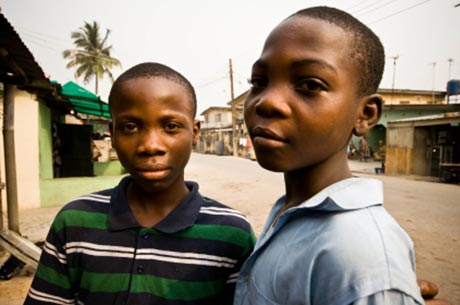(单词翻译:单击)
情景对话
Todd: So, Abidemi, we've been talking about your country, Nigeria. Now, you've mentioned that there's different langauges in different regions.
托德:阿比德米,我们继续来谈你的祖国尼日利亚。你提到过尼日利亚不同地区有不同的语言。
Abidemi: That's correct.
阿比德米:没错。
Todd: Now, are they similar or are they completely different?
托德:这些语言是有相似之处还是完全不同?
Abidemi: I believe they're completely different. Nigeria has over 250 languages.
阿比德米:我认为这些语言完全不同。尼日利亚有超过250种语言。
Todd: Whoa, really, 250 for the whole country?
托德:哇哦,整个国家有250种语言?
Abidemi: Yes. Yes. So that's not even counting the dialects, when you start breaking them down into dialects, I believe there are over 500, maybe even thousands of dialects, because Nigeria was a British colony, so these were distinct communities and groups of people before the British came in. So that's why, one of the reasons we have so many languages. However, we have four official languages, of course English, we need that to unite everybody. And in schools people learn English. We all have Yoruba in the southwestern part of Nigeria, which is my native language. We have Igbo in the southeastern part and Hausa in the northern part of Nigeria, yes.
阿比德米:对,没错。这甚至还没有算上方言,如果按方言划分的话,我想大概有500种以上,甚至可能有数千种方言,因为尼日利亚曾是英国殖民地,所以这些不同的社区和不同的人群是在英国殖民统治以前形成的。这就是尼日利亚有如此多语言的原因。我们有四种官方语言,英语当然是其中一种官方语言,因为我们要把所有人团结起来。学校里也教英语。尼日利亚西南部地区说约鲁巴语,这也是我的母语。另外,尼日利亚东南部地区说伊格博语,北部地区说豪萨语。
Todd: Wow! Can you talk a little bit about each language? Now, you said your language is Yoruba?
托德:哇哦!你每种语言都会吗?你的母语是约鲁巴语?
Abidemi: Yes, that's correct, Yoruba is a tonal language like Chinese or Cantonese, unlike Cantonese, we have three tones and not four, so ba, ba, ba, I don't know if you can tell the difference between those three words but they are different, three different words. Igbo, I'm not so sure, but it's a completely different language, if somebody's speaking it I would not be able to understand.
阿比德米:对,没错,约鲁巴语同汉语和粤语一样是声调语言,不过同粤语不同的是,我们只有3个声调,而不是4个,我们的声调是这样的,我不知道你能不能听出这3个词的区别,不过的确是有区别的。我不太了解伊格博语,那是一种完全不同的语言,如果有人说伊格博语,我基本上听不懂。
Todd: And what region is that in?
托德:哪个地区使用这个语言?
Abidemi: It's in the southeastern part of Nigeria. And then finally Hausa, it's more ... it's closer to Arabic I believe and a lot of Hausas are Muslims, so I think there's that relationship between those two languages.
阿比德米:尼日利亚的东南部地区。我认为豪萨语更接近阿拉伯语,许多豪萨族人是穆斯林,所以我认为豪萨语和阿拉伯语之间存在联系。
Todd: So they sound completely different from each other?
托德:这些语言听起来完全不同吗?
Abidemi: Completely different, and because we have so many languages sometimes you would have a neighboring community but people can't understand each other unless they speak in English because their languages are nothing alike, yeah.
阿比德米:完全不同,因为我们的语言太多了,有时虽然生活在邻近社区,但人们听不懂对方说的话,除非他们说英语,因为他们的语言完全不同。
Todd: So how common is it to find somebody who speaks all three languages, the three major languages?
托德:那会说这三种主要语言的人多吗?
Abidemi: There are some people who do. There are some people who do, especially businessmen, a lot of Yorubas and Igbos are very business oriented, but traditionally men, they will travel to different parts of Nigeria and some other countries in West Africa to do trade. So for those people it was essential to learn languages, so those people can. Nowadays most people just speak two, you speak English and your native language. So maybe it's becoming rarer and rarer to find people who speak all three languages.
阿比德米:有些人三种语言都会。基本上商人都会,许多约鲁巴族人和博格族人经商,通常经商的都是男性,他们在尼日利亚各个地区和其他西非国家做生意。对这些人来说,学习不同的语言非常有必要,所以他们可以说三种语言。现在大部分人会说两种语言,英语和母语。也许现在越来越难找到会说三种语言的人了。
Todd: So are these languages all taught in the school system?
托德:那学校里会教这些语言吗?
Abidemi: For the most part no, which I think it's very unfortunate, I think it's something we should be very proud of. But now the emphasis is on English. So a lot of parents want their children to learn English in school, the top schools are mainly English and the onus is on the families to teach their children their native languages at home or maybe if you live in a neighborhood, for example if you're Yoruba like I am, if you live in a neighborhood where there are other Igbos, of course you would have Yoruba at home and Igbo being spoken to you by your friends and you might be able to pick it up that way, but generally no. So for me, when I was growing up I went to English speaking schools so I learned English at school, I never learned my native language at school at all. But at home I tried by myself, I studied my language by myself, so that's how I learned to speak.
阿比德米:基本上不教,我认为这非常不幸,这本来应该是我们引以为傲的事情。但是现在的教学重点是英语。许多父母希望他们的孩子在学校学习英语,一些顶级学校也以英语教学为主,家庭则承担起在家教孩子母语的任务,如果你邻近的社区……举个例子,如果你和我一样是约鲁巴族,如果你住的社区有博格族人,你可以在家学习约鲁巴语,和朋友们学习博格语,你也可以这样来学习,不过学校上基本上不教这些语言。我小时候上的是英语教学的学校,所以我在学校学习英语,我完全没有在学校学过母语。不过我在家自学了母语,我就是这样学会母语的。
Todd: So do you think you'll pass on the language to your children some day?
托德:那你将来会教你的孩子语言吗?
Abidemi: I want to, most definitely, yes. I think from learning different languages myself, I speak French as well, I think it's really important, my native language is my language and as much as English is important in the world today, I think my native language, Yoruba, is part of my identity. And for my children too, I think it's important for them to learn, so yes, I would like them to speak it.
阿比德米:我当然会。我也会说法语,我学习了不同的语言,我的母语是我的本土语言,和世界语言英语同样重要,我认为我的母语约鲁巴语是我身份的一部分。对我的孩子来说也是如此,我认为让他们学习母语非常重要,所以我会教他们。
Todd: Oh, I agree, one's native language is always the most important.
托德:好,我同意你的观点,一个人的母语是最重要的。
Abidemi: Exactly. Exactly.
阿比德米:没错,没错。
Todd: That's cool though, so you've got three distinct different languages, more.
托德:这真酷,你们有3种不同的语言,实际上你们有更多语言。
Abidemi: More. More.
阿比德米:对,更多。
Todd: More, but three major distinct languages.
托德:更多,不过这3种是主要的语言。
Abidemi: Yes, these are the three major ethnicities — ethnic groups in Nigeria, yes.
阿比德米:对,尼日利亚有三大主要的民族。
Todd: Well thanks.
托德:谢谢你。
Abidemi: Thank you.
阿比德米:谢谢。

译文属可可原创,仅供学习交流使用,未经许可请勿转载
重点讲解
重点讲解:
1. break down 分解;将…分成若干部分;
例句:Most Americans tend to break down addresses into number street, maybe unit number, city, state, zip code.
多数美国人往往把地址分成街道号、街区号、城市、州和邮政编码。
2. each other 彼此;互相;
例句:The two plans meshed with each other smoothly.
这两个计划互相配合得很好。
3. for the most part 大部分;多半;通常;
例句:The contributors are, for the most part, professional scientists.
投稿者大多是专业科学家。
4. pass on 将…传给;将…交给;
例句:Tradition is passed on by the elders of the tribe.
部族的传统由长者承袭相传。


